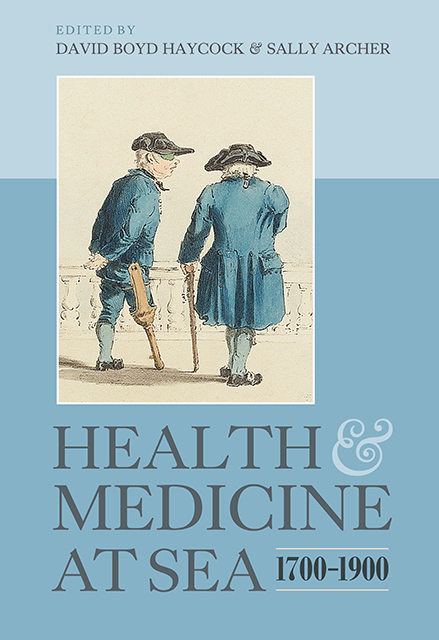Book contents
- Frontmatter
- Contents
- List of Figures and Tables
- Preface
- List of Contributors
- Acknowledgements
- List of Abbreviations
- Introduction Health, Medicine and the Maritime World: A History of Two Centuries
- 1 ‘The Intention is Certain Noble’: The Western Squadron, Medical Trials, and the Sick and Hurt Board during the Seven Years War (1756–63)
- 2 Royal Navy Surgeons, 1793–1815: A Collective Biography
- 3 Surgery in the Royal Navy during the Republican and Napoleonic Wars (1793–1815)
- 4 The Sick and Hurt Board: Fit for Purpose?
- 5 An ‘Important and Truly National Subject’: The West Africa Service and the Health of the Royal Navy in the Mid Nineteenth Century
- 6 Mortality and Migration: A Survey 128
- 7 Slave Purchasing Strategies and Shipboard Mortality: Day-to-Day Evidence from the Dutch African Trade, 1751–1797
- 8 Ships, Families and Surgeons: Migrant Voyages to Australia in the Age of Sail
- 9 Medical Encounters on the Kala Pani: Regulation and Resistance in the Passages of Indentured Indian Migrants, 1834–1900
- Bibliography
- Index
2 - Royal Navy Surgeons, 1793–1815: A Collective Biography
Published online by Cambridge University Press: 07 March 2023
- Frontmatter
- Contents
- List of Figures and Tables
- Preface
- List of Contributors
- Acknowledgements
- List of Abbreviations
- Introduction Health, Medicine and the Maritime World: A History of Two Centuries
- 1 ‘The Intention is Certain Noble’: The Western Squadron, Medical Trials, and the Sick and Hurt Board during the Seven Years War (1756–63)
- 2 Royal Navy Surgeons, 1793–1815: A Collective Biography
- 3 Surgery in the Royal Navy during the Republican and Napoleonic Wars (1793–1815)
- 4 The Sick and Hurt Board: Fit for Purpose?
- 5 An ‘Important and Truly National Subject’: The West Africa Service and the Health of the Royal Navy in the Mid Nineteenth Century
- 6 Mortality and Migration: A Survey 128
- 7 Slave Purchasing Strategies and Shipboard Mortality: Day-to-Day Evidence from the Dutch African Trade, 1751–1797
- 8 Ships, Families and Surgeons: Migrant Voyages to Australia in the Age of Sail
- 9 Medical Encounters on the Kala Pani: Regulation and Resistance in the Passages of Indentured Indian Migrants, 1834–1900
- Bibliography
- Index
Summary
Great Britain emerged from the great wars against Revolutionary and Napoleonic France between 1793 and 1815 as the world's foremost maritime and imperial power. Its ultimate victory in a struggle of unprecedented intensity owed much to significant advances in naval health. Despite recognition of the seminal nature of this revolution, relatively little is known of the approximately two thousand surgeons who realised it through the daily care of the Navy's seamen and marines, often under the most adverse conditions. Much of what has been written about the surgeons of the Georgian Royal Navy has been impressionistic in nature, given the limitations of source material. There are few surviving manuscript memoirs or collections of correspondence written by the surgeons themselves. Much contemporary printed commentary is often highly polemical in nature, and this has helped to create a negative image of their antecedents and ability, produced by reformers campaigning for improvements in Army and Navy surgeons’ rank, pay, training and service conditions. Popular fiction has also coloured perceptions, beginning with Tobias Smollett's caricature in Roderick Random (1748), while historical novelists such as C.S. Forester have at times portrayed the surgeon as a middle-aged sawbones, driven to the Navy by alcoholism or incompetence. At the other extreme, Patrick O’Brian's Stephen Maturin, skilled physician and world-renowned natural philosopher, embodies the highest attainments of a handful of elite practitioners, and is hardly more typical.
This essay presents a report of an ongoing research project, which seeks to provide a detailed and accurate collective biography of the naval surgeons of the French Wars, and forms part of a wider study of the role played by the medical corps of the Army and Navy in promoting social opportunity, professionalisation and Britishness during the Industrial Revolution. It is a work of social history, elucidating their origins, education, service careers, civilian practice, family, material welfare, intellectual interests, and wider contribution to contemporary British society. As it is impossible to treat all of these subjects here, attention will be concentrated upon the naval surgeons’ background, medical training and professional expertise, as themes of most immediate interest to the naval historian.
- Type
- Chapter
- Information
- Health and Medicine at Sea, 1700-1900 , pp. 38 - 62Publisher: Boydell & BrewerPrint publication year: 2009



